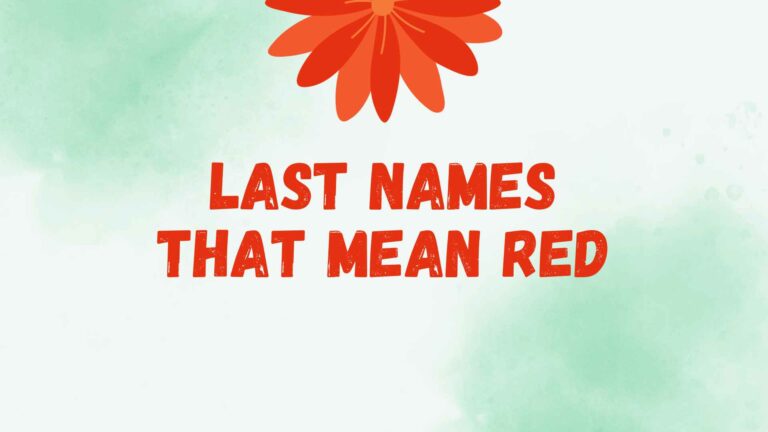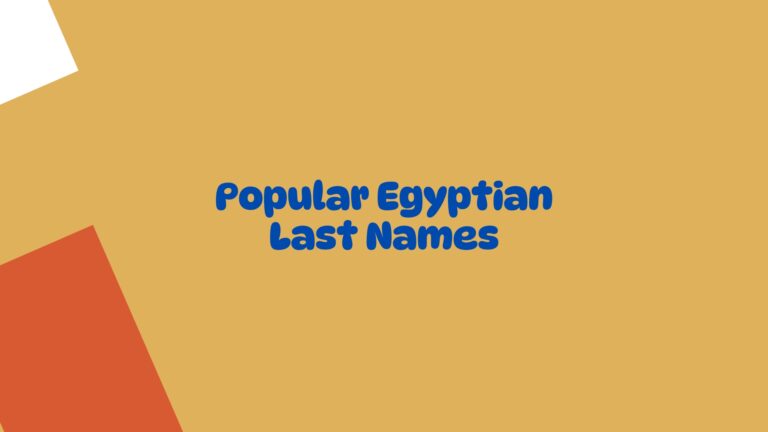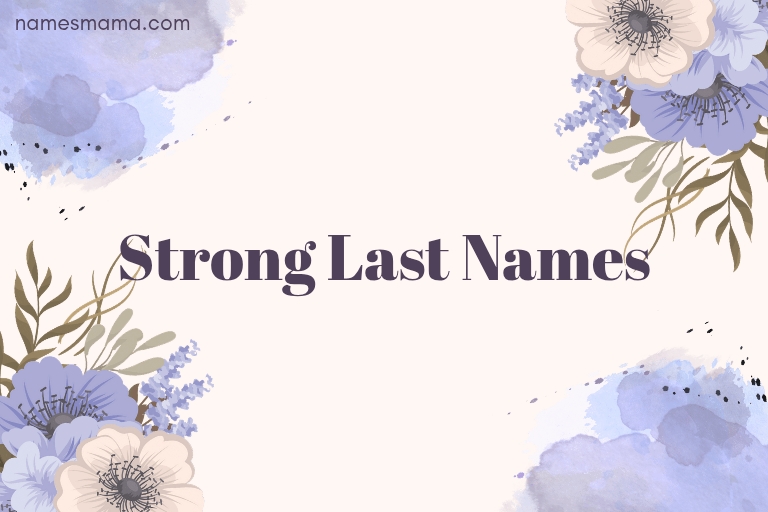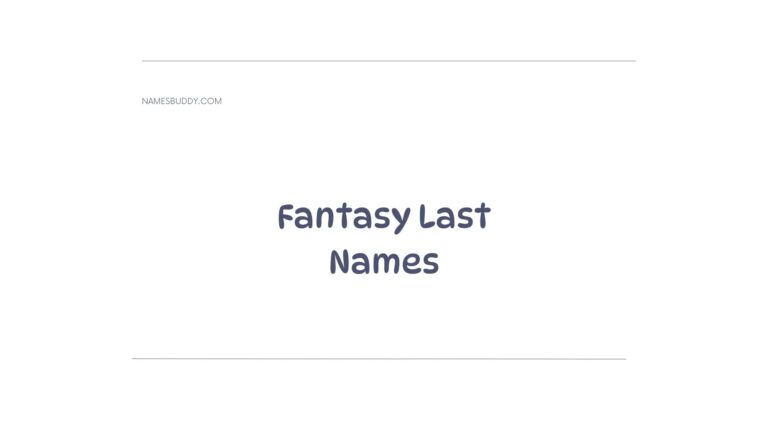100 Cool Uncommon Last Names
Choosing a last name can often be both a reflection of family history, cultural heritage, or even an indication of personal identity.
While common last names such as Smith, Johnson, and Garcia are popularized, some stand as reminders of their rarities and unique origins.
Whether coming from an ancient profession, geographical location, or linguistic progression, they may hold great stories regarding their meaning.
With this article, we’ll look into different edges of these unique last names-its beauty, meaning, and essence.
If you want something unique or are just curious about rare surnames, stay tuned!
Uncommon last names
Acker – German origin, meaning “field” or “plowman.”
Almond – English, derived from the almond tree or “noble protector.”
Bancroft – English, meaning “bean field” or “field near a slope.”
Beauchamp – French, meaning “beautiful field.”
Blackwood – Scottish, referring to someone from a dark forest.
Braddock – English, meaning “broad oak.”
Calvert – English, meaning “herdsman” or “cowherd.”
Carrington – English, meaning “settlement of the people of Cara.”
Chadwick – Old English, meaning “village of Chad.”
Colburn – English, meaning “cold stream.”
Crispin – Latin, meaning “curly-haired.”
Dalloway – English, meaning “assembly place in the valley.”
Deveraux – French, meaning “from Evreux” (a region in France).
Drummond – Scottish, referring to someone from a ridge or high ground.
Eldridge – Old English, meaning “wise ruler.”
Ellsworth – English, meaning “noble estate.”
Fairchild – Old English, meaning “beautiful child.”
Farnsworth – English, meaning “fern-covered estate.”
Fenwick – English, meaning “farm near a marsh.”
Galbraith – Scottish, meaning “foreign Briton” (a reference to settlers from Britain in Scotland).
Garrick – French/Old German, meaning “spear ruler.”
Godwin – Old English, meaning “God’s friend.”
Griswold – Old English, meaning “gray forest.”
Hathaway – English, meaning “path across a heath.”
Holloway – English, meaning “sunken road” or “hollow path.”
Inglewood – English, meaning “wood of the English people.”
Jardine – French, meaning “gardener” or “enclosed garden.”
Kensington – English, meaning “town of Cynsige’s people.”
Kingswell – English, meaning “king’s spring or well.”
Loxley – Old English, meaning “woodland clearing of Locc.”
Merrick – Welsh, meaning “ruler of the sea.”
Montague – French, meaning “pointed mountain.”
Nethercott – English, meaning “cottage in the lower valley.”
Norcross – English, meaning “northern cross” or “crossing in the north.”
Ormsby – Old Norse, meaning “village of Ormr” (a personal name meaning serpent or dragon).
Pemberton – English, meaning “town on a hill.”
Quinlan – Irish, meaning “descendant of Caoinlean” (meaning slender or graceful).
Radcliffe – Old English, meaning “red cliff” or “red slope.”
Renshaw – English, meaning “raven’s wood.”
Sherbourne – English, meaning “bright stream.”
Thackery – English, meaning “roof thatcher.”
Tolliver – English, derived from the French “Talavera,” meaning “fertile land.”
Upton – Old English, meaning “upper town.”
Vanderbilt – Dutch, meaning “from the hill.”
Wainwright – English, meaning “wagon maker.”
Westcott – English, meaning “western cottage.”
Yarborough – Old English, meaning “fortified town near a river.”
Zeller – German, meaning “cellar dweller” or “one who lives near a monastery.”
Zephyr – Greek, meaning “west wind.”
Winslow – English, meaning “hill belonging to Wine’s people.”
Abernathy – Scottish, meaning “mouth of the river Nethy.”
Ainsworth – English, meaning “enclosure by the oak trees.”
Ashford – Old English, meaning “ford near the ash trees.”
Bellerose – French, meaning “beautiful rose.”
Blaylock – Scottish, meaning “dark-haired person.”
Bramwell – Old English, meaning “broom-covered well or spring.”
Carroway – English, possibly linked to the spice caraway or meaning “narrow waterway.”
Chilton – Old English, meaning “farm near a steep hill.”
Clifton – Old English, meaning “settlement by a cliff.”
Cuthbert – Old English, meaning “famous and bright.”
Davenport – Old English, meaning “port where deer are found.”
Delacroix – French, meaning “of the cross.”
Driscoll – Irish, meaning “descendant of the messenger.”
Eastwood – Old English, meaning “wood to the east.”
Everhart – German, meaning “strong as a wild boar.”
Fitzhugh – Norman, meaning “son of Hugh.”
Frobisher – English, meaning “maker of grain sieves.”
Gainsborough – English, meaning “fortified town of Gaini’s people.”
Greenleaf – Old English, meaning “one who lived near lush green foliage.”
Hargrove – Old English, meaning “a grove near the boundary.”
Hollingsworth – Old English, meaning “woodland near a hollow.”
Imlay – Scottish, meaning “from the meadow by the river.”
Jesselton – English, meaning “town of Jesse’s people.”
Keighley – Old English, meaning “field of Cyhha’s people.”
Larkspur – English, derived from the name of a flower.
Lovelace – Old French, meaning “wolf’s den” or “playful wolf.”
Mansfield – Old English, meaning “field by the river.”
Middleton – Old English, meaning “settlement in the middle of two places.”
Norwood – Old English, meaning “northern wood.”
Oakley – Old English, meaning “oak tree clearing.”
Pendleton – English, meaning “hill near a bend in the river.”
Quimby – Scandinavian, meaning “woman’s settlement.”
Redgrave – English, meaning “red-colored grove or thicket.”
Rowntree – Old English, meaning “one who lived near a rowan tree.”
Silverton – English, meaning “estate with silver mines.”
Thornfield – Old English, meaning “field of thorny bushes.”
Underwood – Old English, meaning “one who lived beneath the forest.”
Vauxhall – Old French, meaning “hall of Falkes.”
Wakefield – Old English, meaning “field where wakes (festivals) were held.”
Winterbourne – Old English, meaning “winter stream.”
Xanderly – Possibly Greek, meaning “defender of mankind.”
Yewdale – English, meaning “valley of yew trees.”
Zeigler – German, meaning “brickmaker.”
Beaumont – French, meaning “beautiful mountain.”
Chesterfield – Old English, meaning “open land near a Roman fort.”
Dunmore – Scottish, meaning “fort on a hill.”
Elmwood – English, meaning “forest of elm trees.”
Foxworth – Old English, meaning “enclosure of foxes.”
Henshaw – Old English, meaning “marshy land with wild birds.”
Wycliffe – Old English, meaning “white cliff.”







